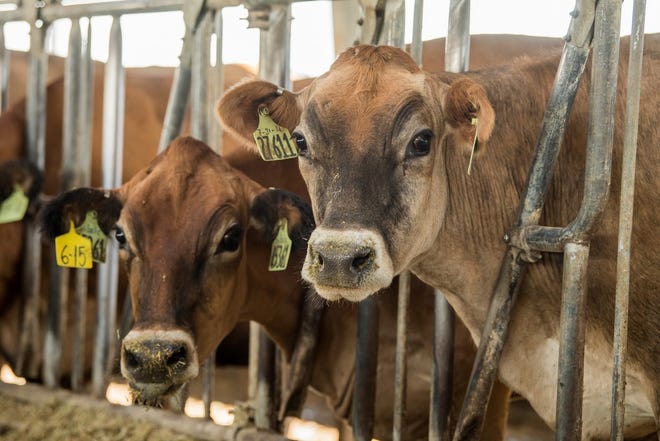
The Boardman, Ore. farm, featured on a recent Dairy Stream podcast episode, was recently awarded with the 2020 Outstanding Dairy Sustainability Award from the Innovation Center for US Dairy.
General manager Marty Myers said the dairy relies on a “closed-loop” system that continuously recycles products, byproducts and resources on the farm for cost savings and efficiency.
Myers explained that it “all starts with the cow.” Threemile grows 60% of the feed they need for their herd on nearly half of their acreage. Myers said then they process manure from their own cows through digesters that create methane as a form of renewable natural gas they then use for power, saving money on electricity. Through this process, the manure is also separated into liquids and solids, where the liquids are used for extra crop fertilizer, removing the need for traditional fertilizers, and the solids are used for cow bedding.
“Everything basically is a circular motion on the farm,” Myers said. “It all starts with the cow, and the dairy is the engine.”
Myers added that all excess farm-grown crops, like potatoes and vegetables, are sold to processing plants and customers in the area so as not to create waste. Processing waste products are also returned to the herd feeding operations.
Threemile is saving $4-5 million a year, Myers said, because of their fertilizer process. The dairy is located in a dry area of Oregon that only gets 8 inches of rain per year on average, requiring an intricate irrigation system to properly water crops. He also said the dairy farm raises all of its calves through the entire birthing and raising process right on the farm instead of transporting them to a calf care facility, cutting out transportation costs.
“We raise the calves that are born every day, all the way from calves to milk cows or beef animals, so there’s no transportation for these animals to go to calf raising facilities,” Myers said. “They stay on the farm for their total lives, and we control the environment that they’re raised in.”
Myers said their methane digesters were built in 2012 and allowed them to discover a new way of increasing profit using natural resources. He said dairy farmers should know that in order to start producing methane for your own use, you need to invest in a facility that will clean the methane to make it “pipeline quality” – he said that cost is about $1,000 per cow.
He also said a pipeline is needed to run across the farm in order to carry the gas. Myers said they inject the methane into the pipeline, which can then be transported to producers who will make it into fuel. The value of creating and selling renewable natural gas like methane is much more significant than trying to create electricity, Myers said.
Threemile’s young herd also feasts on mint waste from a mint farmer who leases acreage from them. Cows should not eat actual mint leaves because it can affect the taste of their milk and beef, but mint waste can serve as an effective straw replacement with young calves, Myers said. Other byproducts the herd eats come from grass, potatoes and onions. He continued to emphasize that this helps to reduce costs in buying product from outside sources.
“(It’s a) replacement to traditional feed, that is a cost savings to us,” Myers said. “It makes our cost of growing those heifers or beef animal, much lower than it would by buying feeds from outside sources.”
Myers explained that Threemile takes animal welfare very seriously, and farmers should also install processes that protect it. At his dairy farm, Myers said the company has an animal welfare committee, an animal advocate and an independent farm auditor, which all work with senior leadership and staff to create improvements in farm operations.
The animal welfare committee includes 20 livestock specialists on the farm who meet monthly to discuss the herd’s activities and welfare as well as draft recommendations to management on how to make cows happier and more comfortable. The farm’s animal advocate, Myers said, is a professor and licensed veterinarian who also visits the farm monthly to provide training to staff. And the auditor makes a visit to the farm at least once a year to observe farm operations, interview employees and give advice to leadership on how to improve their farm.
“They give us a scorecard on animal health, and we get that report card after they’re done, and then they also have an exit interview with our management team,” Myers said. “Fortunately we were one of the first dairies, if not the only dairy, to receive a 100% scorecard in 2018. We have always received scorecards that are above 95 percent.”
Myers noted that his farm’s ventures in technology and robotics have led to a 17% decrease in mastitis among the herd. Myers said investments in technology produce returns on them, creating a better bottom line. One of the best ways Threemile has been able to increase sustainability, Myers said, was through their electric-powered water pumps that continuously move water throughout the farm. They have conservation partnerships with engineering firms, where they learned to decrease their electricity usage while still being able to use the water they need for farming operations.
“Water is a valuable commodity to us, and we may not be using less water on an annual basis, but how we effectively use that and create an economic benefit and beneficial use from that water is very, very important,” Myers said.
Farms should create more internship programs because it will help bring in better employees, Myers added. He said the Threemile internship program has created value in their sustainability efforts because they recruit college students to work on their fields and with their herds, and many of those students come into the job with forward-thinking ideas and values surrounding sustainability improvements.
Threemile’s internship program started with three interns in 2000, Myers said, adding that many members of the company’s middle management are past interns. He said farms with internship programs should invest in recruiting from their local colleges and universities to hire students who have a passion for agriculture right in their hometown. He said the company offers scholarships to all interns who stay through the end of their summer internship, and many get invited back for future work, even in post-graduate jobs.
“A lot of these young interns that become managers in our business, they’re young, they bring new ideas, they bring new technological abilities that some of us older people haven’t learned in our career, and those ideas cultivate opportunities in our operations,” Myers said.
Myer’s final words of advice told farmers not to do everything by yourself if you’re not an expert – instead, create partnerships with the experts for better business and greater efficiency. It’s also helpful in keeping up with industry trends and new innovation, he said, especially in areas that you don’t know all too well. Myers also said that the size of the farm doesn’t matter in how good it is for the community or industry because all farms should be striving to improve their operations.
“There’s room for farms of all sizes. Coexistence is important, and we can all learn from each other,” Myers said. “You can be a large farming operation or a small farming operation, but if you don’t manage it well and try to continuously improve, you’re going to get left behind.”

























